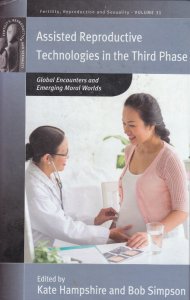© 2017 Anna OZHIGANOVA
2017 № 2 (14)
 Key words: Assisted Reproductive Technologies, Bioethical Bricolage, Local Moral Worlds, Moral Pioneers, Reproductive Choice, Stratified Reproduction
Key words: Assisted Reproductive Technologies, Bioethical Bricolage, Local Moral Worlds, Moral Pioneers, Reproductive Choice, Stratified Reproduction
Abstract: The collective monograph “Assisted Reproductive Technologies in the Third Phase. Global Encounters and Emerging Moral Worlds”, edited by Kate Hampshire and Bob Simpson in 2015, examines the social consequences of the global spread of Assisted Reproductive Technologies. Based on scrupulous ethnographic work, these studies show how ART reception is carried out in different social and cultural contexts: in the local moral worlds of Islam, under conditions of stratified reproduction in economically poor countries and in ethno-cultural communities of immigrants from South Asia in the UK.
 Review on the book “Assisted Reproductive Technologies in the Third Phase. Global Encounters and Emerging Moral Worlds”, edited by Kate Hampshire and Bob Simpson, N.Y., Oxford: Berghahn, 2015.
Review on the book “Assisted Reproductive Technologies in the Third Phase. Global Encounters and Emerging Moral Worlds”, edited by Kate Hampshire and Bob Simpson, N.Y., Oxford: Berghahn, 2015.
The authors refer to the terms “local moral worlds” (Kleinman 1997) and “moral pioneers” (Rapp 1988). They also proposed the term “bioethical bricolage” to analyze how ART reception in different cultures inspires people to experiments and bioethical innovations, and provokes the emergence of new meanings in their notions of health and well-being, kinship and inheritance. This phenomenon has fully manifested itself in recent years, when, according to the authors, ART entered a third, global, stage of development. This phase began in the late 2000s and is characterized by a rapid expansion of access to the New Reproductive Technologies for the people all over the world.
References
Bochoy, A. (2015) Ethics, Identities and Agency: ART, Elites and HIV/AIDS in Botswana, Assisted Reproductive Technologies in the Third Phase. Global Encounters and Emerging Moral Worlds , K. Hampshire and B. Simpson (eds.), N.Y., Oxford: Berghahn, p. 135-151.
Chatoo, S. (2015) Reproductive Technologies and Ethnic Minorities: Beyond a Marginalising Discourse on the Marginalised Communities, Assisted Reproductive Technologies in the Third Phase. Global Encounters and Emerging Moral Worlds , K. Hampshire and B. Simpson (eds.), N.Y., Oxford: Berghahn, p.191-213.
Clarke, M. (2015) ‘Islamic Bioethics’ in Transnational Perspective, Assisted Reproductive Technologies in the Third Phase. Global Encounters and Emerging Moral Worlds, K. Hampshire and B. Simpson (eds.), N.Y., Oxford: Berghahn, p. 30-45.
Colen, Sh. (1995) Like a Mother to Them’: Stratified Reproduction and West Indian Childcare Workers and Employers in New York, Conceiving the New World Order: The Global Politics of Reproduction, F. Ginsburg and R. Rapp (eds.), Berkeley: University of California Press, p. 78–102.
Inhorn, M. (2015) New Reproductive Technologies in Islamic Local Moral Words, Assisted Reproductive Technologies in the Third Phase. Global Encounters and Emerging Moral Worlds, K. Hampshire and B. Simpson (eds.), N.Y., Oxford: Berghahn, p. 20-29.
Glossary on ART Terminology (2009) ICMART and WHO Revised Glossary on ART Terminology (http://www.who.int/reproductivehealth/publications/infertility/art_terminology2_ru.pdf).
Hörbst, V. (2015) A Child Cannot Be Bought? Economies of Hope and Failure when Using ARTs in Mali, Assisted Reproductive Technologies in the Third Phase. Global Encounters and Emerging Moral Worlds, K. Hampshire and B. Simpson (eds.), N.Y., Oxford: Berghahn, p.152-170.
Hudson, N. et Culey, L. (2015) Knock, Knock, ‘You’re my Mummy’: Anonymity, Identification and Gamete Donation in British South Asian Communities, Assisted Reproductive Technologies in the Third Phase. Global Encounters and Emerging Moral Worlds, K. Hampshire and B. Simpson (eds.), N.Y., Oxford: Berghahn, p.214-229.
Kleinman, A. (1997) Writing at the Margins: Discourse between Anthropology and Medicine, Berkeley: University of California Press.
Kupka, M.S. et al. (2014) Assisted reproductive technology in Europe, 2010: results generated from European registers by ESHRE, Human Reproduction, Vol. 29, Issue 10, p. 2099-2113. (http://humrep.oxfordjournals.org/content/early/2014/07/27/humrep.deu175.abstract).
Levi-Strauss, C. (1994) Nepriruchennaja mysl’ [Untamed thought], Pervobytnoe myshlenie [The Savage Mind], M.: Respublika, p. 111-336.
Nahar, P. (2015) Childlessness in Bangladesh: Women’s Experiences of Access to Biomedical Infertility Services, Assisted Reproductive Technologies in the Third Phase. Global Encounters and Emerging Moral Worlds, K. Hampshire and B.Simpson (eds.), N.Y., Oxford: Berghahn, p.119-134.
Rapp, R. (1988) Moral Pioneers: Men, Women and Fetuses on the Frontier of Reproductive Technology, Gender at the Crossroads of Knowledge: Feminist Anthropology in the Postmodern Era, M. di Leonardo (ed.), Berkeley, Los Angelos, London: University of California Press, p.383-396.
Simpson B. et Hampshire, K. (2015) Assisted Reproductive Technologies: a Third Phase? Assisted Reproductive Technologies in the Third Phase. Global Encounters and Emerging Moral Worlds, K. Hampshire and B.Simpson (eds.), N.Y., Oxford: Berghahn, p.1-19.
Tremayne, S. (2015) Whither Kinship? Assisted Reproductive Technologies and Relatedness in the Islamic Republic of Iran, Assisted Reproductive Technologies in the Third Phase. Global Encounters and Emerging Moral Worlds, K. Hampshire and B. Simpson (eds.), N.Y., Oxford: Berghahn, p.69-82.
This article is currently available in full version in Russian